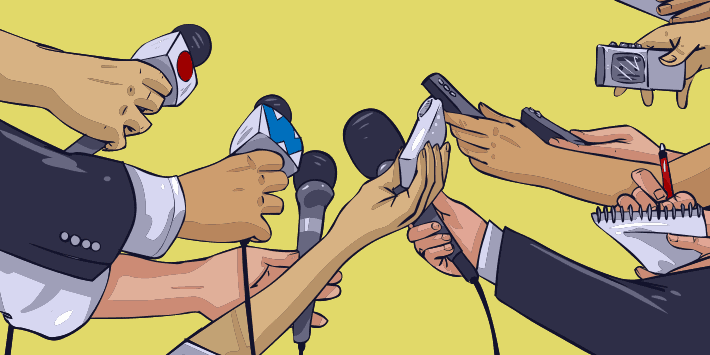
Notorious cases with high media interest can be assigned to any judge in any court. Judges who need immediate help navigating calls from reporters, bloggers in their courtroom, or news cameras at their home have a new resource at their fingertips. The National Judicial College has just released High Media Interest Cases: A Self-Study Online Course. This brand-new self-study course for judges is designed to be completed in one to two hours and may be completed at any time, day or night.
Below, we offer some tips for judges who are creating relationships with the media. Both journalists and judges have unique, important roles to play. When each respects and understands each other’s role, the public benefits. This list offers just a glimpse of the information included in the course.
- Encourage and establish continuing interdisciplinary educational opportunities and dialogue among judges, journalists and lawyers to foster an understanding of each other’s roles through journalism schools, law schools, and The National Judicial College.
- Assume there is access to all court proceedings and records and place the burden of proof for closure on the entity seeking secrecy. Privacy issues may overcome the presumption in appropriate cases.
- Refrain from imposing gag orders on the news media or attorneys. Courts should seek other remedies in lieu of gag orders except in extraordinary cases.
- Establish and support bench/bar/media committees, which will meet regularly in every community to address issues of mutual concern.
- Establish guidelines for trial-press management in high-profile cases. Court official should confer and consult with media representatives to avoid unanticipated problems and understand each other’s legal constraints.
- Consider professional standards for journalists that are non-binding. Refer to the Society of Professional Journalists Code of Ethics for guidance.
- Assume that cameras should be allowed in the courtroom, including the federal court system, and that such access should be limited or excluded only for strong reasons.
- Encourage judges to explain, on the record, the reasons for rulings.
- Determine when and if it’s appropriate to compel reporters to testify or produce notes, tapes, etc., understanding that the media cannot serve as an arm of law enforcement.
- Encourage media organizations to develop an ombudsman system to hear recommendations from the courts and public wherever feasible.
This list was created by former director for the NJC Center for Courts and Media Gary Hengstler, for a course called Essential Teamwork in Dealing with the Media.
High Media Interest Cases: A Self-Study Online Course
Sponsored by the Rollan D. Melton Fund
Donald W. Reynolds National Center for Courts & Media
The course consists of three self-study modules designed to be completed in about two hours. Each of the following modules has readings, checklists, quizzes, and other interactive features to engage the judge in the material. The three modules are:
- Establishing Relationships and Developing a Media Plan
- What to Do When Reporters Contact You
- Reporters and New Media in Your Courtroom
Judges who complete the self-study portion may elect to participate in a live, one-hour webcast hosted by the faculty for the course — judges with experience in cases with high media interest, public information officers, and experts in First Amendment and the courts. The webcast can accommodate additional questions and judges can engage in peer-to-peer learning with other judges from around the country. Webcasts are scheduled for 10:00 a.m. Pacific on the following dates in 2016:
- March 15
- June 14
- September 20
- December 6
The course is $99. Judges who complete both the self-study portion and the live portion are eligible for three hours of CLE credit. Learn more and register for the course here.
About Rollan Melton
The late Rollan Melton was a noted journalist in Reno, Nevada, who was keenly interested in the relationship between the courts and the media. He held prominent leadership positions with Gannett including: 1) senior vice president in the Newspaper Division, 2) heading the Gannett West group 3) member of the Gannett Board of Directors and 4) a leading force for the creation of USA Today. He served multiple times on the Board of Trustees of The National Judicial College and was the Board’s secretary. Rollan understood the importance of fair and impartial courts in a democratic society and the courts’ role in ensuring that the government shall not “abridge the freedom of speech or of the press.”

CHICAGO – The American Bar Association Judicial Division announced recently that TheNational Ju...

The National Judicial College is mourning the loss of former faculty member Judge Duane Harves, who passed ...

As the world manages an evolving natural environment, The National Judicial College announced today that it...

Do’s Manage your cases systematically Devise a system that works for you and your organizational...

After 22 years of teaching judges, Tennessee Senior Judge Don Ash will retire as a regular faculty member a...